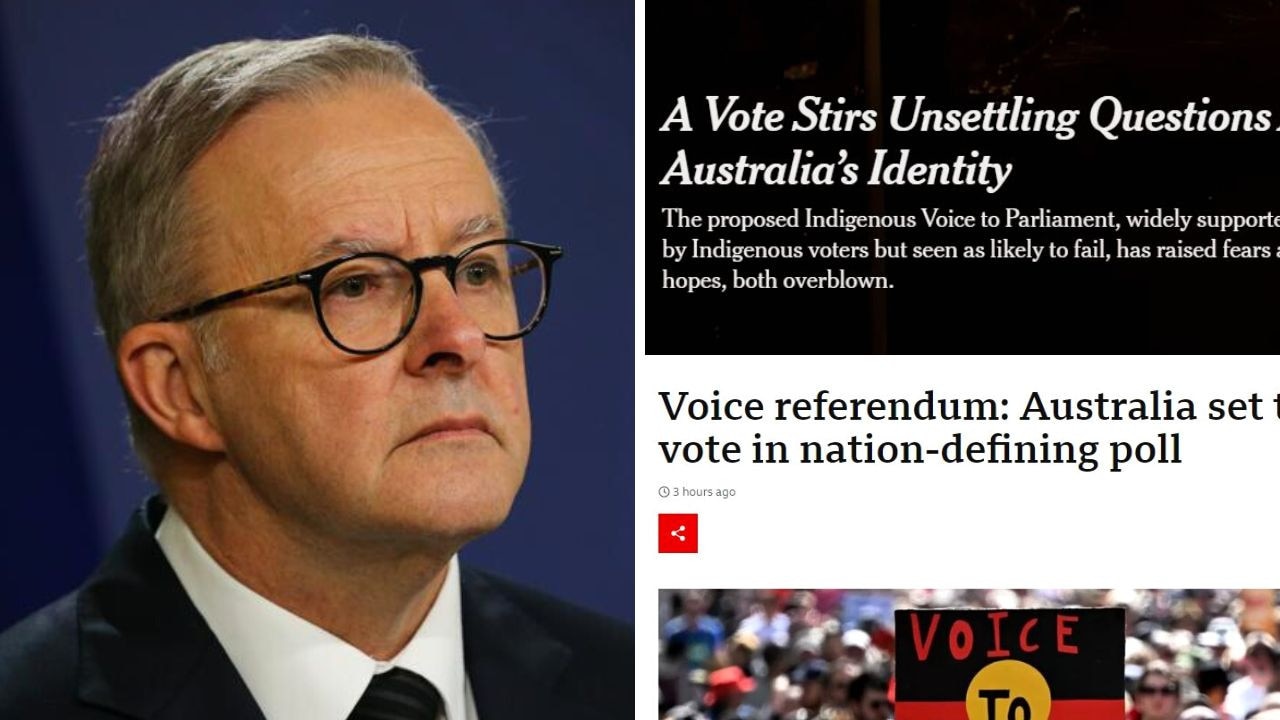Today, millions of Australians will head to the polls to decide whether an Indigenous Voice to Parliament will be enshrined in the constitution.
Australians will be asked to vote ‘Yes’ or ‘No’ to the following question: “A proposed law: to alter the Constitution to recognise the First Peoples of Australia by establishing an Aboriginal and Torres Strait Islander Voice. Do you approve this proposed alteration?”
People from both sides of the debate have been campaigning for months, but if you are still unsure about how to cast your vote, check out news.com.au’s guide of everything you need to know before heading to the polls.
We will be updating this blog throughout the day to bring you the latest developments.
‘Uncomfortable fault lines’: World watching on
As Australia prepares to make a historic decision, the rest of the world has made it clear they are watching very closely.
Major international media outlets have commented the Voice vote and haven’t held back in expressing what they think a ‘No’ vote will mean for the nation.
The BBC has branded today’s referendum a “nation-defining poll”, noting a Yes vote will recognise First Nations people in the constitution and establish a body to advise the government on issues affecting Indigenous communities.
“A No outcome will reject both reforms,” the article states.
“The historic vote has exposed uncomfortable fault lines, and raised questions over Australia’s ability to reckon with its past.”
A New York Times article claimed that the Voice vote is stirring “unsettling questions about Australia’s identity”, while also noting the bid is “likely to fail”.
“The coming vote has surfaced uncomfortable, unsettled questions about Australia’s past, present and future,” the article states.
“Does it recognise its colonial history as benign or harmful? How does it understand the disadvantages facing Indigenous people?
“Should the hundreds of Indigenous tribes that first inhabited the continent have the right to decide if and how to meld their traditions and cultures into modern society, or just be encouraged to assimilate?”
11th hour Voice poll shows swing in votes
There has been a late swing to the Yes vote, however, it is not enough secure a majority in any state, according to the final Newspoll before the referendum.
Newspoll conducted for The Weekend Australian shows a three-point swing toward a Yes vote over the past week to 37 per cent.
But a clear majority – 57 per cent of surveyed voters – told pollsters they intend to vote No.
The number of undecided voters has dwindled to just 6 per cent of voters.
According to Newspoll, if this number broke equally the final result would be 60-40 against the Voice.
For a referendum to pass, it needs to reach a double majority. This means the majority of the nation as a whole and the majority of states have to vote Yes.
More than 50 per cent of the population in four of Australia’s six states – NSW, Victoria, Queensland, South Australia, Tasmania and West Australia – need to vote in favour of the change.
Votes in the Northern Territory and the ACT only count towards the national vote.
‘Kindness costs nothing’: Albo’s final plea to voters
Prime Minister Anthony Albanese has issued his final plea to voters, telling Australians it will cost them nothing to “show kindness” when they enter the polling booth today.
“This week of all weeks, where we see such trauma in the world, there is nothing, no cost to Australians in showing kindness with their heart as well as their head when they enter the polling booth tomorrow and voting Yes,” he said.
“Because, my goodness, kindness costs nothing. Thinking of others cost nothing.”
Opposition Leader Peter Dutton told Nine Network that he is hoping for a No vote outcome, claiming the proposition “hasn’t been properly explained”.
“It’s divisive, it’s permanent once it goes into the Constitution, and I just don’t think in their millions Australians are going to support it,” he said.
“It won’t be a message of rejection to Indigenous Australians, quite the opposite. We want practical outcomes for people in Indigenous communities.”
